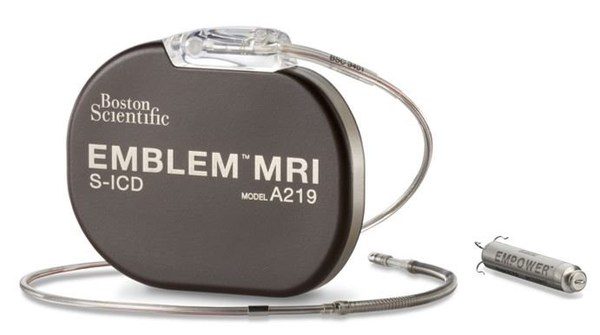What To Know
- 1 Today, patients who may benefit from receiving an S-ICD System are often implanted with a TV-ICD due to the possibility of a future need for bradycardia pacing or ATP – the latter of which is a therapy designed to terminate episodes of fast, abnormal heart rates.
- “Since the EMPOWER MPS device can be delivered percutaneously via a minimally invasive approach without the use of leads, the mCRM System could preserve many of the benefits of the S-ICD System while offering an option for patients who subsequently develop a pacing requirement,”.
Boston Scientific Corporation (NYSE: BSX) has initiated the MODULAR ATP clinical trial to evaluate the safety, performance and effectiveness of the mCRM™ Modular Therapy System. The mCRM System consists of two cardiac rhythm management (CRM) devices intended to work together to coordinate therapy: the EMBLEM™ MRI Subcutaneous Implantable Defibrillator (S-ICD) System and the EMPOWER™ Modular Pacing System (MPS), which is designed to be the first leadless pacemaker capable of delivering both bradycardia pacing support and antitachycardia pacing (ATP).
The S-ICD System is a proven treatment option for the prevention of sudden cardiac death and, because it provides protection without touching the heart or substernal space, eliminates many of the complications associated with leads placed in those locations. Recent data from the PRAETORIAN trial comparing the S-ICD to transvenous implantable cardioverter defibrillators (TV-ICDs) confirmed that the S-ICD – which, to date, has been implanted in more than 100,000 patients worldwide – can be the preferred therapy choice for the majority of ICD-indicated patients without a need for pacing.1 Today, patients who may benefit from receiving an S-ICD System are often implanted with a TV-ICD due to the possibility of a future need for bradycardia pacing or ATP – the latter of which is a therapy designed to terminate episodes of fast, abnormal heart rates.
The EMPOWER MPS, which consists of a leadless pacemaker and delivery catheter, is designed to complement the S-ICD System by providing a modular option for patients who develop ATP needs in the future, potentially expanding the patient population that can benefit from S-ICD therapy.
“Since the EMPOWER MPS device can be delivered percutaneously via a minimally invasive approach without the use of leads, the mCRM System could preserve many of the benefits of the S-ICD System while offering an option for patients who subsequently develop a pacing requirement,” said Kenneth Stein, M.D., FACC, FHRS senior vice president and chief medical officer, Rhythm Management and Global Health Policy, Boston Scientific. “The components of the system are designed to work in concert with each other, regardless of when implanted, giving physicians the ability to provide personalized patient care today while keeping options open in the future.”
The prospective, non-randomized MODULAR ATP clinical trial will enroll at up to 50 centers in the U.S., Canada and Europe up to 300 patients who are guideline-indicated for an ICD or who already have an EMBLEM or EMBLEM MRI S-ICD System implanted. The trial will evaluate the system- and procedure-related complication-free rate of the EMPOWER MPS, the communication success between the EMPOWER MPS and the S-ICD System and adequate pacing capture thresholds of the EMPOWER MPS.
The first patients in the U.S. were enrolled by Daniel J. Cantillon, M.D., FACC, FHRS, Cleveland Clinic. Dr. Cantillon, Reinoud Knops, M.D., PhD, Department of Cardiology, Academic Medical Centre (Amsterdam, Netherlands), Vivek Reddy, M.D., director, Cardiac Arrhythmia Services, Mount Sinai Hospital; and Prof. Lluis Mont, M.D., PhD, FESC, Arrhythmia section head, University of Barcelona are serving as principal investigators of the study.
Preclinical data presented as late-breaking basic science at American Heart Association Scientific Sessions 2021 demonstrated that the mCRM System had excellent performance at up to 18 months, as defined by stable communication between devices, and ability to deliver therapy as intended.
